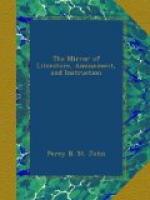“Don’t be surprised if I play all sorts
of antics! I am like a child with a new rattle!
Here is a letter from my friend Lord Byron, telling
me he has dedicated to me his poem of the ‘Corsair.’
Ah, Mrs.——, it is nothing new for
a poor poet to dedicate his poem to a great lord; but
it is something passing strange for a great lord to
dedicate his book to a poor poet.” Those
who know him most intimately feel no sort of hesitation
in declaring, that he has again and again been heard
to express regret at the earlier efforts of his muse;
or reluctance in stating, at the same time, as a fact,
that Mr. M., on two different occasions, endeavoured
to repurchase the copyright of certain poems; but,
in each instance, the sum demanded was so exorbitant,
as of itself to put an end to the negotiation.
The attempt, however, does him honour. And, affectionate
father as he is well known to be, when he looks at
his beautiful little daughter, and those fears, and
hopes, and cares, and anxieties, come over him which
almost choke a parent’s utterance as he gazes
on a promising and idolized child, he will own the
censures passed on those poems to be just: nay
more—every year will find him more and
more sensible of the paramount importance of the union
of female purity with female loveliness—more
alive to the imperative duty, on a father’s
part, to guard the maiden bosom from the slightest
taint of licentiousness. It is a fact not generally
suspected, though his last work, “The Epicurean,”
affords strong internal evidence of the truth of the
observation, that few are more thoroughly conversant
with Scripture than himself. Many of Alethe’s
most beautiful remarks are simple paraphrases of the
sacred volume. He has been heard to quote from
it with the happiest effect—to say there
was no book like it—no book, regarding
it as a mere human composition, which could on any
subject even “approach it in poetry, beauty,
pathos, and sublimity.” Long may these
sentiments abide in him! And as no man, to use
his own words, “ever had fiercer enemies
or firmer friends”—as no man, to use
those of others, was ever more bitter and sarcastic
as a political enemy, more affectionate and devoted
as a private friend, the more deeply his future writings
are impregnated with the spirit of that volume, the
more heartfelt, let him be well assured, will be his
gratification in that hour when “we shall think
of those we love, only to regret that we have not
loved more dearly, when we shall remember our enemies
only to forgive them.”
* * * * *
RETROSPECTIVE GLEANINGS.
* * * * *
REGAL TABLET.
(For the Mirror.)
The following Synopsis of English Sovereigns, and their contemporaries, will, it is hoped, be acceptable to the readers of history.
JACOBUS.
(Normans.)




